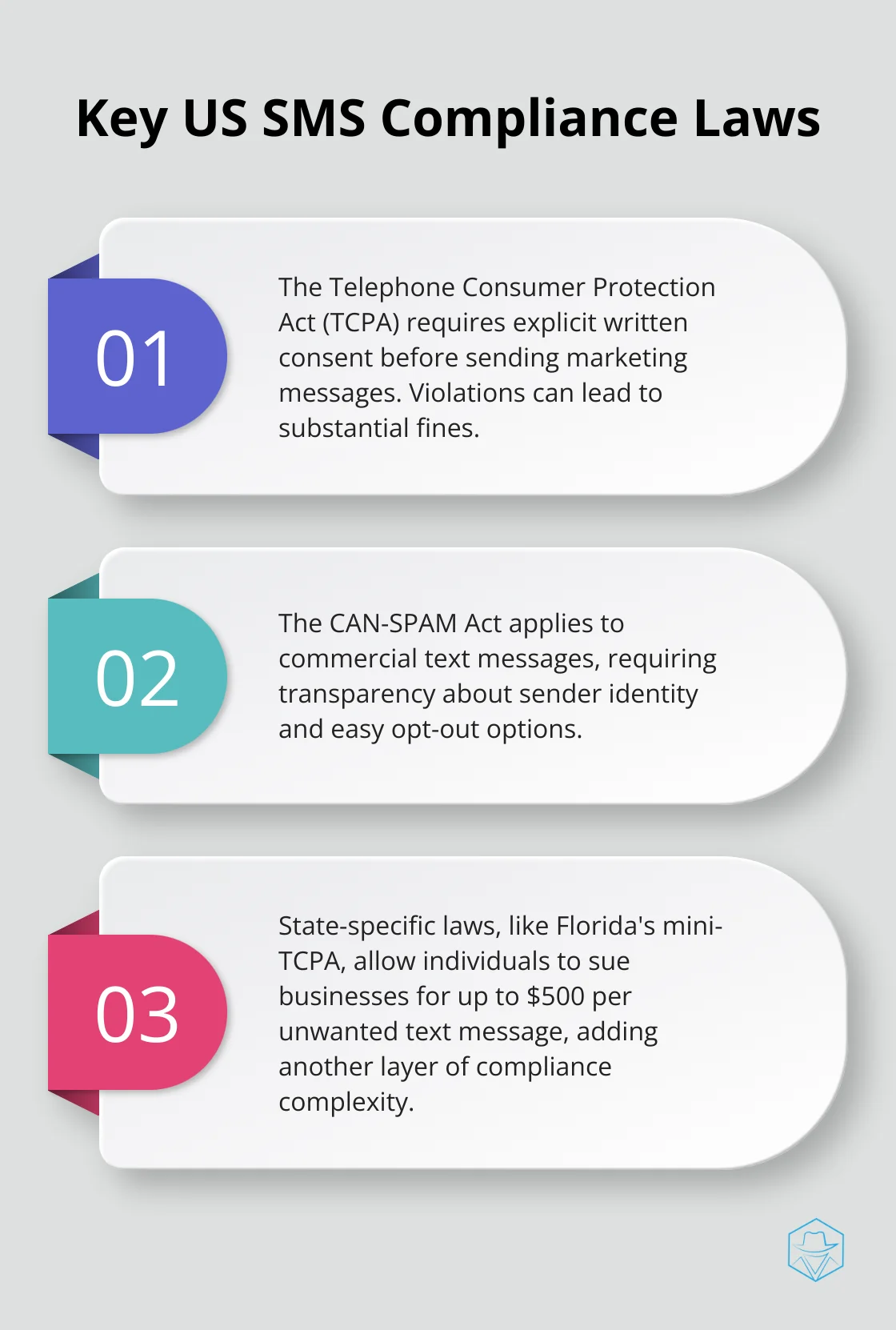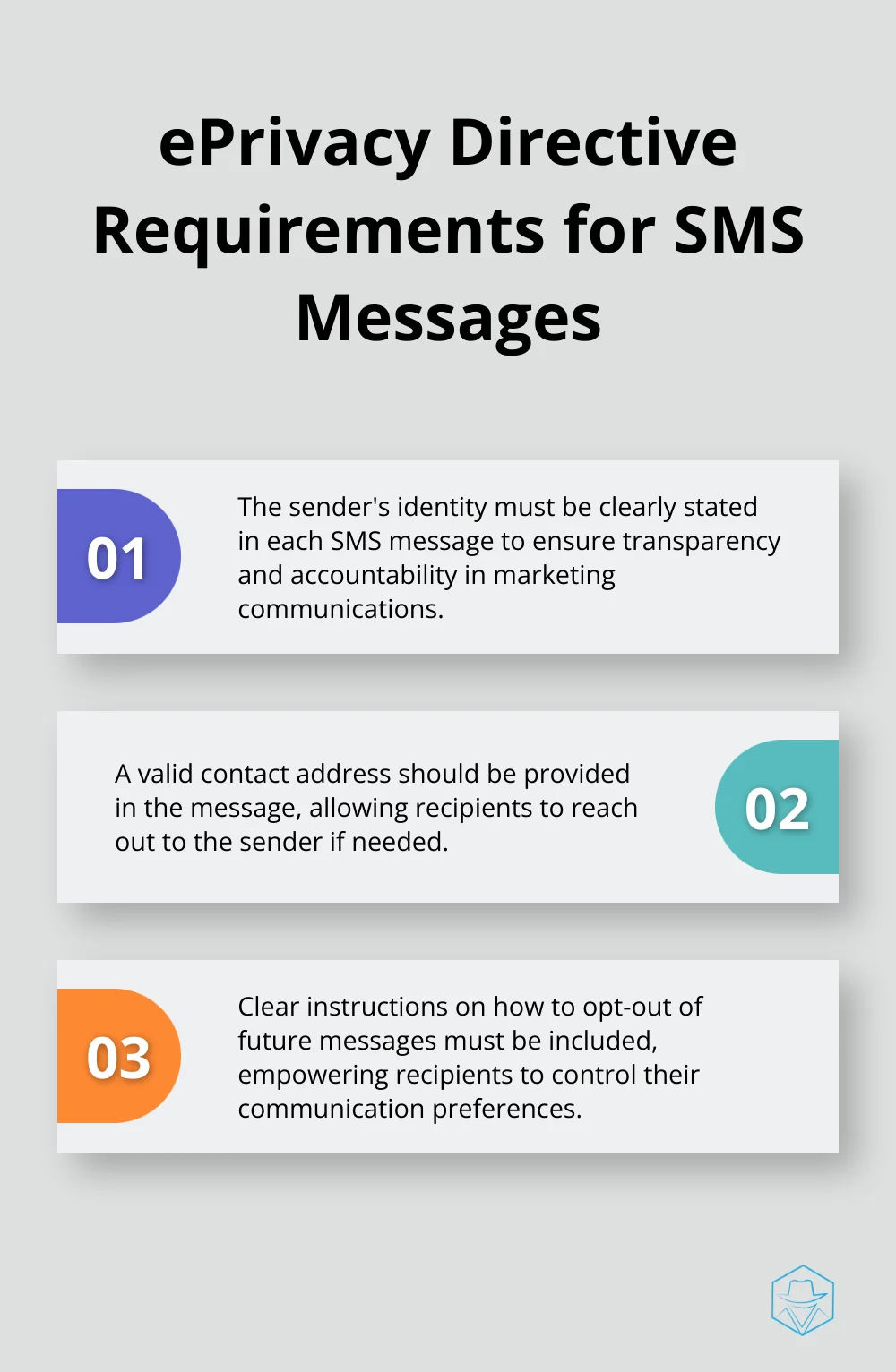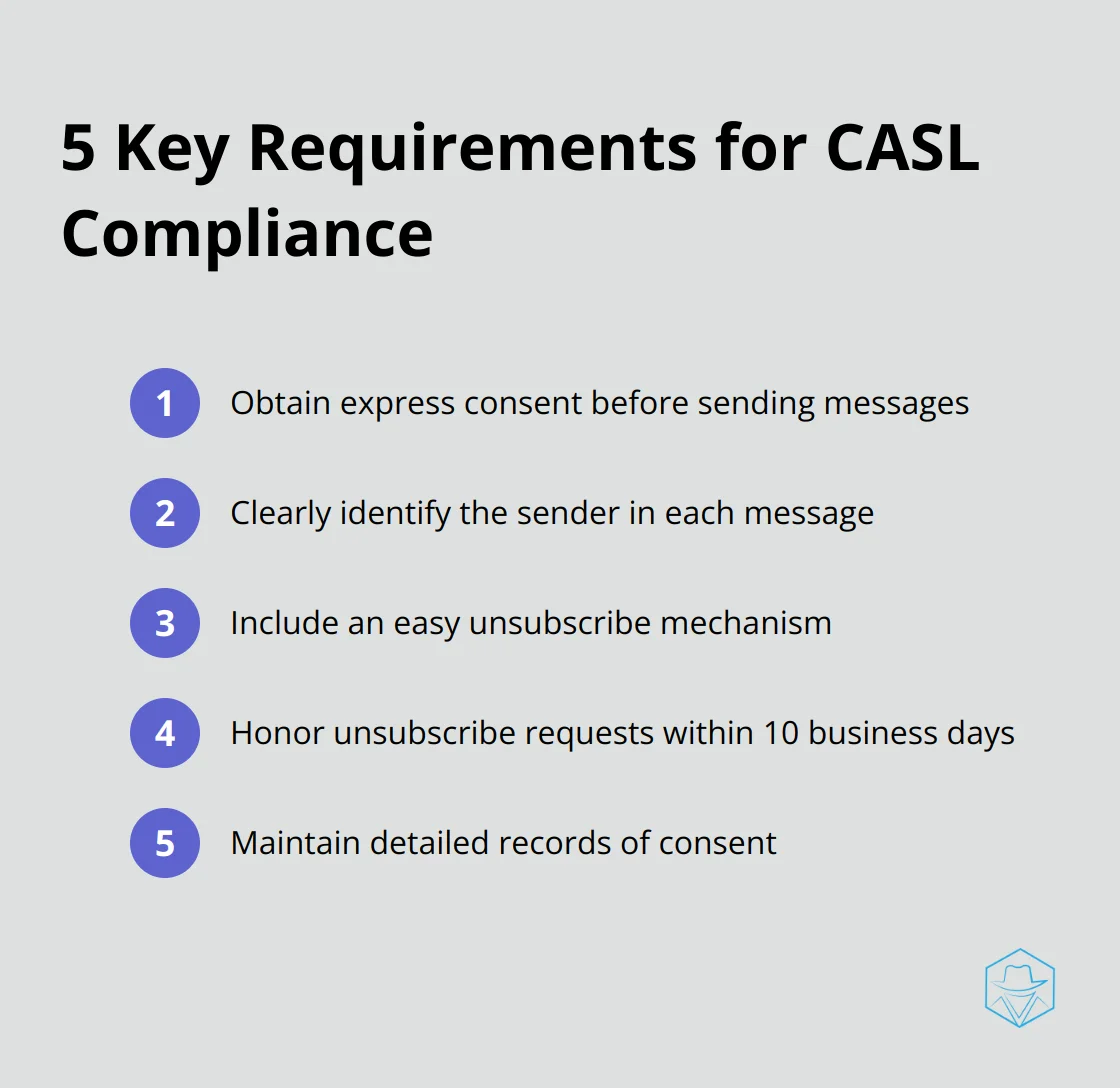Navigating SMS Compliance Laws Across Different Countries [2025]
![Navigating SMS Compliance Laws Across Different Countries [2025]](/blog/wp-content/uploads/emplibot/sms-compliance-laws-hero-1756195578.webp)
At Drop Cowboy, we understand the complexity of navigating SMS compliance laws across different countries. As businesses expand their reach globally, it’s crucial to stay informed about the diverse regulations governing SMS marketing.
This guide explores the key SMS compliance laws in major markets, including the United States, European Union, Canada, Australia, and China. We’ll provide insights into best practices for maintaining compliance and the importance of adapting to evolving regulations in the ever-changing landscape of SMS marketing.
What Are the Key SMS Compliance Laws in the US?
The United States imposes strict regulations on SMS marketing to protect consumers from unwanted messages and safeguard their privacy. These laws form a complex framework that businesses must navigate to run successful SMS campaigns without legal risks.
The Telephone Consumer Protection Act (TCPA)
The TCPA stands as the cornerstone of SMS compliance in the US. Enacted in 1991 (and updated several times since), this federal law sets the ground rules for telemarketing practices, including SMS marketing. The TCPA requires businesses to obtain explicit written consent before sending marketing messages to consumers. This consent must be clear, conspicuous, and not hidden in fine print.
Companies that violate TCPA face substantial fines. In 2020, a major retailer paid $6.8 million to settle a TCPA lawsuit for sending promotional text messages without proper consent. To avoid such costly mistakes, businesses should implement a robust opt-in process and maintain detailed records of consent.
CAN-SPAM Act and SMS Marketing
While the CAN-SPAM Act primarily focuses on email marketing, it also applies to commercial text messages. This law prohibits false or misleading header information and deceptive subject lines. For SMS marketers, this translates to transparency about the sender’s identity and message content.
A key requirement of CAN-SPAM is to provide a clear and easy way for recipients to opt out of future messages. Including a simple “STOP” keyword in every marketing text allows recipients to unsubscribe with minimal effort.
State-Specific SMS Regulations
Several states have enacted their own “mini-TCPA” laws, adding another layer of complexity. California, Florida, and Washington (among others) have stricter regulations than the federal TCPA. For example, Florida’s mini-TCPA, enacted in 2021, allows individuals to sue businesses for up to $500 per unwanted text message.
To navigate this patchwork of state laws, businesses should adopt a compliance strategy that adheres to the strictest state-level requirements. This approach ensures coverage across all US jurisdictions.

Practical Tips for US SMS Compliance
- Use a double opt-in process to ensure clear consent.
- Maintain detailed records of consent (including when and how it was obtained).
- Include clear opt-out instructions in every message.
- Clean contact lists regularly to remove unsubscribed numbers.
- Stay informed about changes in both federal and state-level regulations.
These guidelines help businesses harness the power of SMS marketing while minimizing legal risks. Compliance isn’t just about avoiding fines-it builds trust with your audience and maintains a positive brand reputation.
As we shift our focus to the European Union, we’ll explore how SMS compliance laws differ across the Atlantic and what this means for global marketing strategies.
How Does the EU Regulate SMS Marketing?
The European Union (EU) imposes strict regulations on SMS marketing to protect consumer privacy and data rights. These rules shape how businesses conduct SMS campaigns across EU member states.
GDPR’s Impact on SMS Marketing
The General Data Protection Regulation (GDPR) transformed data privacy laws in Europe when it took effect in 2018. For SMS marketers, GDPR requires explicit consent before sending promotional messages. Vague opt-ins or pre-ticked boxes no longer suffice.
To comply with GDPR, businesses must:
- Obtain clear, affirmative consent
- Provide detailed information about data usage
- Allow easy opt-outs at any time
- Maintain comprehensive records of consent
Non-compliance can result in substantial fines. In 2019, a German real estate company paid a €14.5 million fine for improper data storage practices (a stark reminder of the consequences of GDPR violations).
ePrivacy Directive: Specific Rules for Electronic Communications
While GDPR covers overall data protection, the ePrivacy Directive (often called the “Cookie Law”) addresses electronic communications, including SMS. This directive requires businesses to secure explicit consent before sending marketing messages.

The ePrivacy Directive mandates that each message includes:
- The sender’s identity
- A valid contact address
- Clear instructions on how to opt-out
Country-Specific Nuances Within the EU
Despite EU-wide regulations, individual countries often have additional requirements. France, for example, prohibits B2C SMS marketing on Sundays and public holidays. Germany requires separate consent for SMS marketing, distinct from other communication forms.
These country-specific rules make it essential for businesses to research local laws before launching cross-border campaigns. Partnering with local legal experts can provide valuable insights into these nuanced regulations.
Practical Steps for EU Compliance
To ensure SMS marketing compliance across the EU, we recommend:
- Implement a robust consent management system
- Regularly audit your contact lists
- Provide clear, concise privacy policies
- Train your marketing team on EU regulations
- Use double opt-in processes for extra security
These steps help businesses harness SMS marketing’s power while respecting EU privacy laws and building trust with their European audience.
As we move beyond the EU, we’ll explore SMS compliance laws in other major markets, starting with Canada’s unique approach to regulating electronic communications.
SMS Compliance Beyond the US and EU
Canada’s Strict Anti-Spam Legislation
Canada’s Anti-Spam Legislation (CASL) stands as one of the world’s strictest electronic messaging laws. It mandates express consent for all commercial electronic messages, including SMS. Unlike the US, where implied consent sometimes suffices, CASL demands clear, documented permission.

To comply with CASL, businesses must:
- Obtain express consent before sending messages
- Clearly identify the sender in each message
- Include an easy unsubscribe mechanism
- Honor unsubscribe requests within 10 business days
Violations can result in fines up to $10 million CAD per violation for businesses. In 2017, a company paid a $1.1 million CAD fine for sending messages without proper consent, highlighting the serious consequences of non-compliance.
Australia’s Spam Act: Consent Takes Center Stage
Australia’s Spam Act 2003 governs SMS marketing with a focus on consent, identification, and unsubscribe options. The Act applies to messages sent from or received in Australia, making it relevant for international marketers targeting Australian consumers.
Key requirements include:
- Obtaining express or inferred consent before sending messages
- Including clear sender identification
- Providing a functional unsubscribe facility
The Australian Communications and Media Authority (ACMA) enforces the Spam Act. In 2019, they issued a formal warning to a political party for sending unsolicited SMS messages, demonstrating their active enforcement.
China’s Complex Regulatory Landscape
China’s approach to SMS marketing regulation involves various laws and agencies. The Regulations on Internet Information Service and the Advertising Law of the People’s Republic of China both impact SMS marketing practices.
Chinese regulations require:
- Prior consent from recipients
- Clear identification of the sender
- Adherence to strict content guidelines
Content restrictions prove particularly stringent in China. Messages must not contain politically sensitive topics, gambling content, or anything deemed harmful to social stability. In 2018, China’s Ministry of Industry and Information Technology launched a campaign against spam messages, resulting in the shutdown of numerous SMS gateways.
Global SMS Compliance: A Balancing Act
Navigating these diverse regulations requires a nuanced approach. We recommend creating a flexible SMS marketing strategy that can adapt to different regulatory environments. This might involve:
- Implementing region-specific opt-in processes
- Customizing message content and timing for each market
- Regularly auditing compliance practices across all active regions
Businesses can build trust with their global audience while avoiding costly legal pitfalls through prioritizing compliance. As SMS marketing continues to evolve, staying informed about international regulations will prove key to successful global campaigns.
Final Thoughts
SMS compliance laws differ significantly across countries, presenting unique challenges for global marketers. We must adapt our strategies to meet diverse regulatory requirements while maintaining effective communication with our audience. This approach ensures legal compliance and builds trust with customers worldwide.
Advanced platforms can help businesses navigate the complexities of international SMS marketing regulations. Drop Cowboy offers tools to streamline compliance and enhance message delivery across borders. These features allow companies to focus on creating impactful campaigns without worrying about regulatory pitfalls.
SMS remains a powerful marketing tool, despite the complex regulatory landscape. Companies that prioritize compliance and leverage technology will unlock the full potential of SMS marketing. This commitment to following SMS compliance laws fosters meaningful connections with audiences globally and drives business growth.
blog-dropcowboy-com
Related posts

June 16, 2025
Explore the Best Ringless Voicemail Services Today
You’re a business owner dialing yet another cold call, and the odds aren’t in your favor. Most don’t answer, and the ones who do sound ready to hang up before you even start. For years, telemarketing meant pushing through that frustration — or blasting SMS and hoping for a bite. Customers want a break from […]

July 20, 2025
iPaaS Comparison: Choosing the Perfect Platform
Compare iPaaS platforms. Find the perfect solution for your business needs with expertise-driven analysis and insights.

August 28, 2025
Is Mimic AI the Future of Personalized Customer Communication?
Explore how Mimic AI technology personalizes customer communication, enhancing engagement and satisfaction by adapting to individual preferences.

July 20, 2025
MessageBird vs Twilio: Which SMS API Is Better?
Compare MessageBird vs Twilio SMS APIs. Discover strengths, pricing, and performance to make an informed choice for your communication needs.

July 1, 2025
How to Optimize Your Contact Center with Five9 Solutions
Optimize your contact center with Five9 solutions to enhance efficiency, boost customer satisfaction, and reduce response times.

April 25, 2025
Multi-Channel Marketing Automation: Boost Engagement
Boost engagement with multi-channel marketing automation. Discover strategies to enhance customer interaction and improve conversion rates.